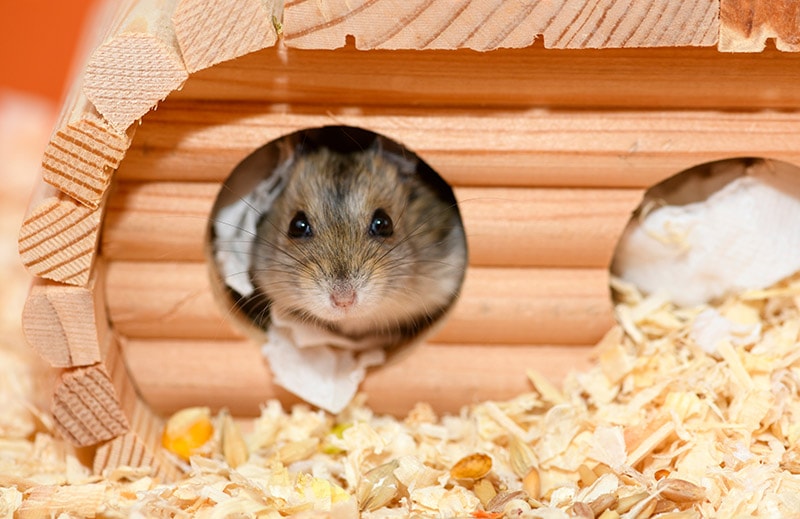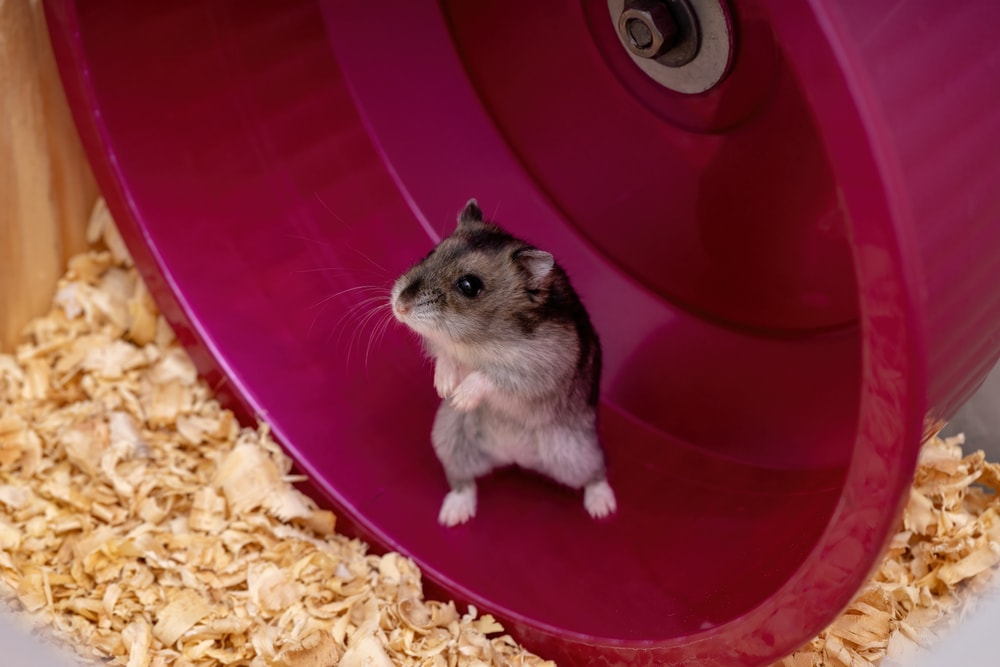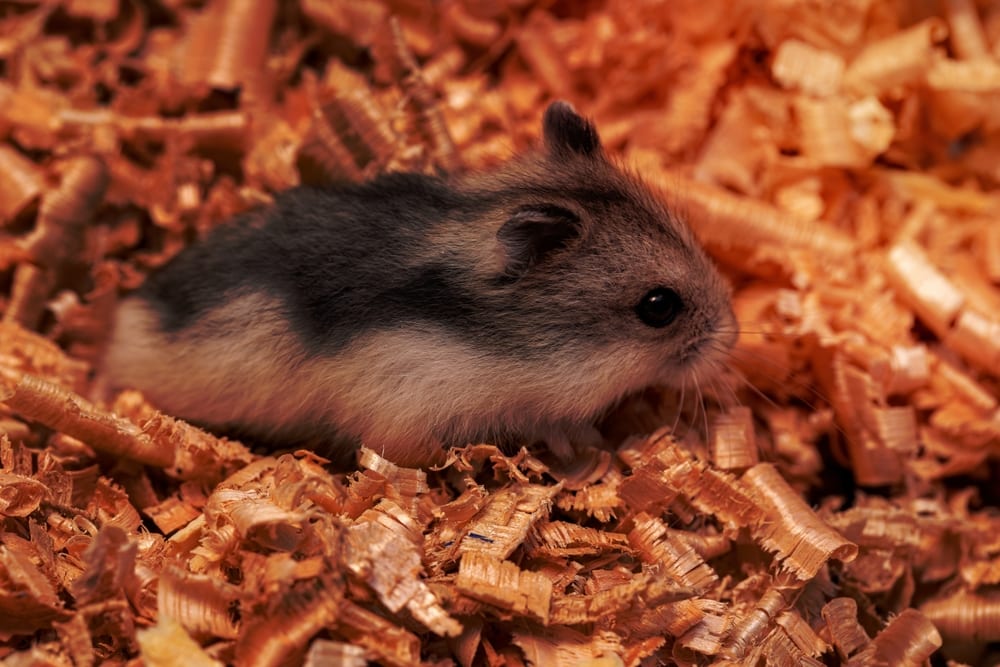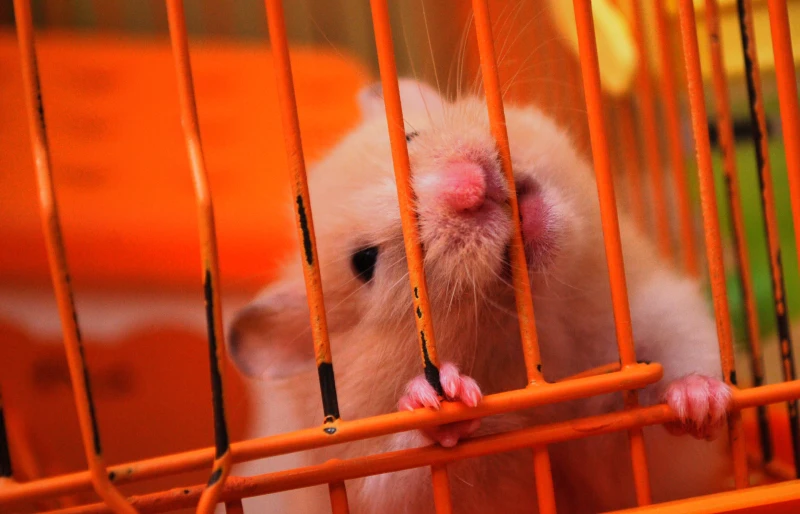Can Hamsters Live Together in the Same Cage? Types & Compatibility
Updated on

Hamsters are typically solitary animals and do not often tolerate being kept with other members of their species. Theoretically, it is possible to keep two together in a very large cage, but it’s often not practical to own a cage the size you would need.
In most cases, it’s not advisable to keep hamsters of different species or even the same species together, as they may fight, leading to injury or even death. Syrian hamsters, in particular, are known to be highly territorial and should always be housed alone.
Can Any Hamsters Live Together?
There are some species that may tolerate being kept in pairs, though, such as the Dwarf hamsters. These hamsters can sometimes be kept together when introduced to each other at a young age and raised together. They must have enough room to minimize competition, which can create aggression. However, there is always a risk that even the most docile hamsters will fight, so they must be monitored closely.
Even if hamsters are housed together fine at first, they usually become aggressive after a short period. It is hard for each hamster to get enough food, water, and space unless they are kept in a very large cage with different feeding areas.
Hamsters do not need to socialize with other hamsters. It’s a common misconception that hamsters need playmates to be happy. However, hamsters do not need interaction from their own kind to be happy. In fact, it may only lead to them becoming stressed.

How Many Hamsters Can Be in One Cage?
In the vast majority of cases, you should only keep one hamster in a single cage. Most hamster species are completely solitary, which means that each individual lives by itself. Most hamsters are not built to live with other hamsters, and they will fight for resources should they be housed with others.
Dwarf hamsters are the only common species that can sometimes be housed together. However, this requires the hamsters to be together since very young, and there is always a risk that they will fight later. It isn’t easy housing two hamsters together, so we don’t typically recommend it.
Theoretically, you can house two hamsters together if their cage is large enough. A large cage would prevent aggression, as there would be plenty of space to go around. However, this cage would need to be very large. Even then, there would still be a chance that the hamsters may fight. In practicality, it is often less stressful for everyone to house hamsters separately in their own, smaller enclosure.
Can I Put My New Hamster with My Current One?
No. You shouldn’t attempt to put a new hamster with your older hamster. Most hamster species are solitary, meaning they do not get along with others. While humans need social interaction, hamsters do not. Instead, they will fight each other when kept together. Hamsters are territorial animals, meaning they will be aggressive towards others in their territory
Even hamster species that are occasionally non-aggressive must be raised together from a very young age to get along. You cannot simply adopt a new hamster and expect it to get along with your old hamster. In all likelihood, the two hamsters would fight, causing injury and even death.
You can occasionally allow hamsters to meet outside of their cages. However, this isn’t recommended. With no benefit to introducing the two hamsters together and plenty of potential downsides, we simply can’t recommend it.

Can You Put Two Syrian Hamsters in the Same Cage?
Teddy bear hamsters, which are also known as Syrian hamsters, are generally solitary animals and should not be housed together in the same cage. Syrian hamsters are highly territorial and tend to be aggressive towards other hamsters, including their own kind. Attempting to keep two Syrian hamsters together in the same cage can lead to serious fights and injuries.
If you own two Syrian hamsters, it is essential that they are kept in their own cages for their safety and well-being. Each cage should be properly sized for them, especially since these hamsters can be pretty large. If you want to provide social interaction for your Syrian hamsters, you can do so through supervised playtime outside of their cages. However, never house them together, as it can lead to stress, aggression, and harm to the hamsters.
Syrian hamsters also don’t need (or benefit) from social interaction with other hamsters. It may be fun for us to see our hamsters interact, but it often isn’t fun for the hamsters.
Do Hamsters Need a Friend?
Not only do hamsters not need a friend, but they don’t want one, either. Hamsters are solitary creatures, which means that they do not like being around other hamsters. In the wild, they would live completely on their own, only interacting with other hamsters for breeding purposes.
That said, that doesn’t mean that your hamster won’t want to interact with you. You should spend time with your hamster each day to keep them tame and mentally stimulated. However, you shouldn’t worry about them being alone for much of the day. That’s exactly how they would be in the wild, too.

 Conclusion
Conclusion
Hamsters do not need interaction with other hamsters, and they should not be kept in the same cage. The vast majority of hamsters are territorial, which means that they will defend their cage from other hamsters. If you put two hamsters together, there is an extremely high chance that they will be aggressive and fight one another.
Dwarf hamsters are the only species that can sometimes be housed together. However, it’s important that the hamsters are littermates or at least raised together since they were very young. Furthermore, even dwarf hamsters are somewhat aggressive, so fights are still common. Hamsters that lived together fine for months may suddenly become aggressive and fight.
Plus, there is no benefit to housing your hamsters together. They do not need or benefit from social interaction with their own kind.
See Also:
Featured Image Credit: Johannes Menge, Shutterstock











